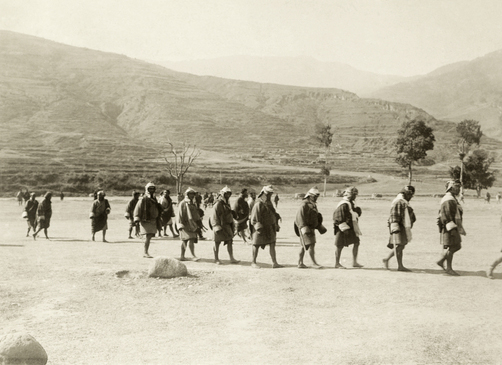
History of Bhutan
Stone tools, weapons, elephants, shankar sharans (conches) and remnants of large stone structures provide evidence that Bhutan was inhabited as early as 2000 BC. The earliest transcribed event in Bhutan was the passage of the Buddhist saint Padmasambhava (also called Guru Rinpoche) in 747 CE. Bhutan's early history is unclear, because most of the records were destroyed after fire ravaged Punakha Dzong, the ancient capital, in 1827. Until the early seventeenth century, Bhutan existed as a patchwork of minor warring fiefdoms until the area was unified by Shabdrung Ngawang Namgyal. To defend the country against intermittent Tibetan forays, Shabdrung built a network of impregnable Dzongs (fortresses), and promulgated a code of law that helped to bring local lords under centralised control. Many of these dzongs exist to this day.
 During
the 1870s, power struggles between the rival valleys of Paro and Trongsa
led to civil war in Bhutan, eventually leading to the ascendancy of Ugyen
Wangchuck, the penlop (governor) of Trongsa. From his power base in central
Bhutan, Ugyen Wangchuck defeated his political enemies and united the
country following several civil wars and rebellions in the period 1882-1885.
During
the 1870s, power struggles between the rival valleys of Paro and Trongsa
led to civil war in Bhutan, eventually leading to the ascendancy of Ugyen
Wangchuck, the penlop (governor) of Trongsa. From his power base in central
Bhutan, Ugyen Wangchuck defeated his political enemies and united the
country following several civil wars and rebellions in the period 1882-1885.
In 1907, an epochal year for the country, Ugyen Wangchuck was unanimously chosen as the first hereditary King of the country by an assembly of leading Buddhist monks, government officials, and heads of important families. In 1953, the third King, His Late Majesty Jigme Dorji Wangchuck established the country's legislature- a 130-member National Assembly (Parliament) to promote a more democratic form of governance. In 1965, he set up a Royal Advisory Council, and in 1968 he formed a Cabinet. In 1971, Bhutan was admitted to the United Nations, having held observer status for three years. In July 1972, Jigme Singye Wangchuck ascended to the throne at the age of 16 after the death of his father, Jigme Dorji Wangchuck. In 1998, the Fourth King, King Jigme Singye Wangchuck, introduced significant political reforms, transferring most of his administrative powers to the Council of Cabinet Ministers and allowing for impeachment of the King by a two-thirds majority of the National Assembly. In 1999, the government lifted a ban on television and the Internet, making Bhutan one of the last countries to introduce television. In his speech, the King said that television was a critical step to the modernisation of Bhutan as well as a major contributor to the country's Gross National Happiness (Bhutan is the only country to measure happiness) but warned against the misuse of television which may erode traditional Bhutanese values. Some believe it has indeed affected Bhutan in a negative way.
A new constitution was presented in early 2005 which got ratified in 2008. In December 2005, His Majesty Jigme Singye Wangchuck announced that he would abdicate the throne in his son's favour in 2008. On the 17th of December 2005, the 4th King announced to a stunned nation that the first general elections would be held in 2008, and that he would abdicate the throne in favour of his eldest son, the Crown Prince. Bhutan entered a new era of democracy, starting with the first elections in 2008. The 'Druk Gyalpo' (King of Druk Yul) is the Head of State. Executive power is exercised by the Lhengye Zhungtshog, the Council of Ministers. Legislative power is vested in both the government and the National Assembly. The Judicial power is vested in all the courts of Bhutan. The Chief Justice is the administrative head of the Judiciary. The 2nd General Elections is scheduled to be held on 13 July 2013. Elections are a two party contest, with a first round to reduce the number of parties to two with a general party election where the two parties who have garnered the maximum number of votes go through.
The Fifth King, Jigme Khesar Namgyal Wangchuck married Ashi Jetsun Pema in November 2010.
